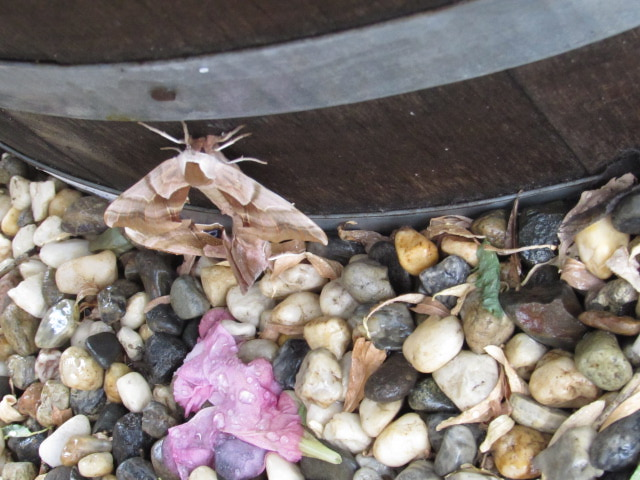Question
 hornworm caterpillar m
hornworm caterpillar m
I read your answer to a question about black spots and hole in my petunia buds. Is this the moth in question ? if so how do I get rid of the black spot and help my petunias be beautiful again. My petunia garden is under my willow tree could this be causing the problem?
AnswerI don't have the answer you read, but let's talk about Hornworm Caterpillars, which morph into Sphinx Moths in maturity.
There's an important concept that I think gets overlooked when people talk about good bugs and bad bugs. Of course anything that likes to make mincemeat out of your Petunias is considered a bad bug. You didn't buy those flowers to feed the insects. You bought them to keep America beautiful, and the bugs are ruining everything.
But read this:
http://acharlottegarden.blogspot.com/2011/07/hornworm.html
Charlotte's message is that the beneficial, flower-friendly "good bugs" -- usually carniverous insects -- won't thrive if they don't have bad bugs. They get hungry. So on the bright side is the fact that those Hornworm Caterpillars may potentially be dinner for a hungry Hornworm-loving beneficial bug.
If you run around with RoundUp or bug spray or anything toxic, you are going to kill every bug in the garden that gets hit with the chemical. So it is good to have those beneficial insects to keep the bag bugs under control. Just don't expect perfection.
When you see the pickled Petunia leaves it's often because females are attracted to the strong fragrance of the Petunias that pours out of the flowers in the dark after the sun goes down. They lay their eggs on the leaves of plants in the nightshade family -- Tomatoes, Nicotiana, Potatoes and Petunias, among others.
Note that these are often confused with damage caused by Potato Flea Beetles, Epitrix cucumeris, which attack the same plants.
The Poplar Sphinx moth, Pachysphinx occidentalis, makes it home in Willows, but they would not enjoy eating Petunias.
If this was my problem, I would head over to Hicks and get some Ladybugs out of the refrigerator one week, put out some Praying Mantis eggs and get this under control. They overwinter easily and it would be nice not to have them around next year.
Then, next spring, be vigilant. This is not difficult. But it takes diligence.
THE LONG ISLAND GARDENER






